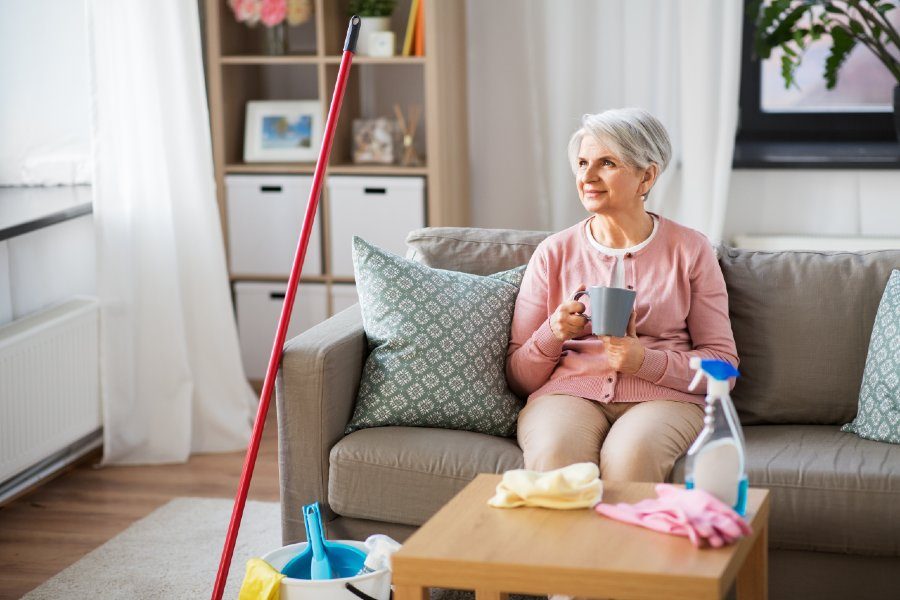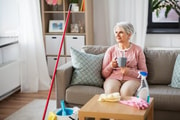
As the calendar soon turns to 2026, many are setting resolutions for better health, more organization, and greater peace of mind. If you're among the millions of Americans over 60 who want a cleaner, safer home this year, you're not alone—and you're making a smart choice for both your physical and mental well-being.
Here's something that might surprise you: maintaining a clean home isn't just about appearances when you're older. Around 3 million older adults visit the emergency room after falling each year, according to the CDC, and many of these accidents happen right at home. Regular cleaning helps ensure that objects like shoes, bags, and other personal items aren't left lying around to become potential fall hazards.
But the benefits go far beyond safety. A tidy environment can boost your mood, improve your sleep, and even help with memory and focus. Ready to discover cleaning habits that work with your lifestyle, not against it? These nine expert-backed strategies are designed specifically with your needs in mind.
Why clean homes matter more as you age
The connection between cleanliness and health becomes even more important with each passing year. The older you get, the more dust can affect your allergies, too. Not only does that mean we're sneezing more often, but it can also affect our balance and hearing.
A clean environment also supports mental clarity. Cleanliness and organization can boost cognitive function and focus. This is particularly beneficial for seniors who may experience cognitive decline or memory issues.
1. Create a realistic cleaning schedule that works for you
Traditional cleaning schedules often assume you have the energy and mobility of someone decades younger. Instead of forcing yourself into an unrealistic routine, create one that respects your current abilities and energy levels.
Start by dividing tasks across the week rather than cramming everything into one exhausting day. Monday might be for light dusting, Wednesday for bathroom maintenance, and Friday for kitchen deep-cleaning. The key is consistency over intensity—doing a little each day prevents overwhelming buildup and reduces the risk of overexertion.
Senior-Friendly Weekly Schedule
Monday: Dust one or two rooms
Tuesday: Light bathroom cleaning
Wednesday: Kitchen counters and appliances
Thursday: Laundry day
Friday: Floors in main living areas
Saturday: Rest or catch-up day
Sunday: Planning for the week ahead
Also read: 20 everyday items you don’t need in retirement—are these still cluttering your home?
2. Embrace the “clean-as-you-go” method with modifications
The clean-as-you-go approach becomes even more valuable as people age, but with some important tweaks. Instead of rushing to clean every spill immediately, focus on safety-critical messes first. Standing water, grease spills, and anything on the floor take priority because these create slip hazards.
Keep cleaning supplies in multiple locations so you're never far from what you need. A small caddy with basic supplies in each bathroom, plus cleaning wipes in the kitchen, means less walking back and forth when your energy or mobility is limited.
3. Make your bed—it's easier than you think
This simple habit takes on new importance when you're spending more time at home. However, arthritis pain and stiffness may interfere with tasks like lifting heavy comforters or reaching across wide beds.
Consider switching to lighter bedding that's easier to manage. Fitted sheets with deep pockets stay put better, reducing the need for frequent adjustments. If reaching across a large bed is challenging, make one side at a time or ask for help with this daily task.
Also read: Simple ways to make your home feel cozy, comfortable, and uniquely yours
4. Declutter with purpose, not pressure
Regular decluttering becomes crucial for safety, but the approach needs to be gentle and realistic. Instead of marathon decluttering sessions that leave you exhausted, commit to just 15 minutes once or twice a week. Focus on one small area—a single drawer, one shelf, or the coffee table.
When deciding what to keep, ask: “Does this serve me now?” rather than getting caught up in sentimental attachments or “what if” scenarios. Remember, creating a safer living space is an act of self-care, not an admission of defeat.
5. Laundry strategies that prevent pile-up
Staying on top of laundry becomes more challenging when bending, lifting, and extended standing are difficult. The solution isn't to do less laundry—it's to do it smarter.
Consider switching to a front-loading washer and dryer if possible, as these eliminate the need to reach into deep tubs. If you have a traditional top-loader, a reacher tool can help you retrieve items from the bottom. Most importantly, wash smaller loads more frequently rather than waiting for large loads that become heavy and unwieldy.
"Divide the work into manageable chunks of time and consistently do a little each day so you don't get overwhelmed."
6. Dust with the right tools and techniques
Dusting takes on new importance for respiratory health, but older adults are more sensitive to fumes and harsh products, making product choice crucial. Microfiber cloths trap dust rather than redistributing it, and they work effectively with just water for most surfaces.
Long-handled dusters eliminate the need for reaching or climbing. For high surfaces like ceiling fans or tall bookshelves, consider hiring help rather than risking a fall. Your safety is worth more than any cleaning task.
7. HVAC filters: a health investment you can't skip
Changing HVAC filters regularly becomes increasingly important as our immune systems age and respiratory sensitivities increase. Set phone reminders for filter changes, and keep extra filters in an easily accessible location.
If changing filters requires climbing or crawling into tight spaces, this is an excellent task to delegate to family members or handyman services. Many HVAC companies also offer maintenance plans that include regular filter changes.
8, Choose cleaning products that protect your health
Chemical sensitivities often increase with age, making product selection more critical than ever. Simple solutions like white vinegar and water work effectively for most surfaces and won't trigger respiratory issues or skin reactions.
Baking soda remains one of the best scrubbing agents for tough messes, and it's completely safe around medications and medical equipment. When you do need commercial cleaners, look for products specifically marketed as non-toxic and fragrance-free.
Also read: 7 Unexpected household tricks you can do with a lint roller
9. Smart weekly deep-cleaning without the exhaustion
Weekly deep-cleaning doesn't mean scrubbing baseboards and washing walls every seven days. Instead, rotate deeper tasks monthly or seasonally. This week might focus on bathroom deep-cleaning, next week on kitchen appliances, and the following week on bedroom organization.
Remember that “good enough” is actually perfect when it comes to maintaining a healthy, safe home environment. Professional help is always an option, and there's absolutely no shame in investing in services that keep you safe and comfortable in your own home.
Getting help when you need it
Over 29% of the US population provides care to a chronically ill, disabled, or aging family member, spending up to 20 hours per week offering care support. You're not alone in needing assistance, and accepting help is a sign of wisdom, not weakness.
Professional cleaning services trained to work with seniors understand your unique needs and safety concerns. They use appropriate products, take care around medical equipment, and can spot potential hazards you might miss.
Your home should be your sanctuary, not your burden. These nine habits aren't just about creating a prettier space—they're about building an environment that supports your health, safety, and happiness for years to come. Start with just one or two changes, and remember that every small step toward a cleaner home is a step toward better living.
Read next:
- 13 dangerous cleaning combos to avoid (and what to do instead)
- Support that feels like home: How today’s care services help seniors stay confident and independent
What cleaning or organizing habit has made the biggest difference in your life? Do you have a favorite hack or a cleaning disaster story to share? Share your thoughts and tips in the comments below—your experience might be exactly what another reader needs to hear.






